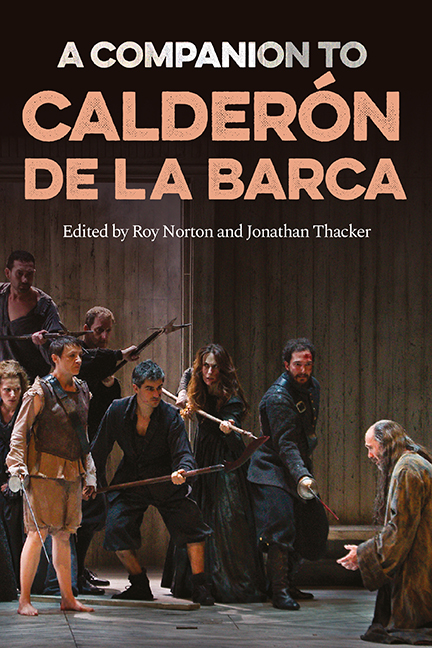Book contents
- Frontmatter
- Dedication
- Contents
- List of Illustrations
- List of Contributors
- Acknowledgements
- List of Abbreviations
- Introduction
- 1 Biography and Context
- 2 The Calderonian World
- 3 The Playwright’s Craft: Calderón and the Great Theatrical World of Early Modern Spain
- 4 La vida es sueño
- 5 The Honour Plays of Calderón
- 6 Calderón, the Comedian
- 7 Mythological Court Spectacle Plays
- 8 Religious comedias
- 9 Calderón’s ‘Sacramental, Allegorical and Historical’ autos
- 10 Calderón’s graciosos
- 11 Calderón and Visual Art
- 12 The Staging of Calderón’s Theatre
- 13 Calderón’s European Reception from Romanticism to the Twentieth Century
- 14 The Reception of Calderón in the Hispanic World
- Appendices
- Consolidated Bibliography
- Index
- Tamesis • Companions
3 - The Playwright’s Craft: Calderón and the Great Theatrical World of Early Modern Spain
Published online by Cambridge University Press: 07 October 2022
- Frontmatter
- Dedication
- Contents
- List of Illustrations
- List of Contributors
- Acknowledgements
- List of Abbreviations
- Introduction
- 1 Biography and Context
- 2 The Calderonian World
- 3 The Playwright’s Craft: Calderón and the Great Theatrical World of Early Modern Spain
- 4 La vida es sueño
- 5 The Honour Plays of Calderón
- 6 Calderón, the Comedian
- 7 Mythological Court Spectacle Plays
- 8 Religious comedias
- 9 Calderón’s ‘Sacramental, Allegorical and Historical’ autos
- 10 Calderón’s graciosos
- 11 Calderón and Visual Art
- 12 The Staging of Calderón’s Theatre
- 13 Calderón’s European Reception from Romanticism to the Twentieth Century
- 14 The Reception of Calderón in the Hispanic World
- Appendices
- Consolidated Bibliography
- Index
- Tamesis • Companions
Summary
Around 1689–90, almost a decade after Calderón's death, theatre apologist Francisco Bances Candamo wrote in his Teatro de los teatros de los pasados y presentes siglos [Theatre of the Theatres of the Past and Present Centuries] that, ‘Don Pedro Calderón de la Barca […] fue quien dio decoro a las tablas y puso norma a la comedia de España, así en lo airoso de sus personajes como en lo compuesto de sus argumentos, en lo ingenioso de su contextura y fábrica, y en la pureza de su estilo. Hasta su tiempo no tuvo majestad la cómica Española’ [It was Don Pedro Calderón de la Barca who brought decorum to the stage and order to Spanish plays: in their graceful characters, their well-conceived plots, the cleverness of their composition and invention, and the purity of their style. Until his time Spanish plays had no majesty]. Bances's praise of Calderón acknowledges his impact as the greatest playwright of the preceding decades; Bances saw in him and his generation the apogee of Spanish drama, therefore placing Calderón within a larger theatrical tradition, one that had dominated the Spanish stage since the end of the sixteenth century, the comedia nueva [new play]. To understand Calderón's creative universe we must see him as part of this rich theatrical milieu, a professionalised, innovative and thriving entertainment industry that permeated many aspects of early modern Spain and had a remarkable impact on the history of European theatre. In the pages that follow, I will approach Calderón as a man of theatre and as a playwright deeply involved in all the major dramatic practices of his time: the commercial stage, palace perfor-mances, religious street theatre and the printing of plays. I will do so by focusing on Calderón's place in early modern Spanish dramaturgy, on his working relationships with the different types of clients he worked with, and on his interactions with print as a medium of the circulation of theatrical texts.
CALDERÓN AND THE COMEDIA NUEVA
When Calderón was born in Madrid in 1600, a sizeable theatre industry was already well established in Spain. Modern theatre in the Iberian Peninsula was over one hundred years old.
- Type
- Chapter
- Information
- A Companion to Calderón de la Barca , pp. 50 - 71Publisher: Boydell & BrewerPrint publication year: 2021



